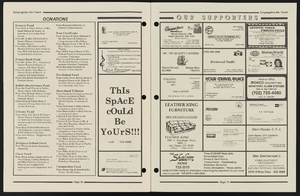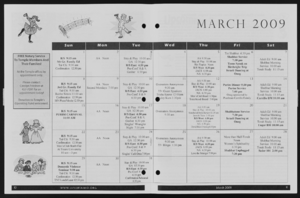Search the Special Collections and Archives Portal
Search Results

Transcript of interview with Daniel Kaminski by Brian Corcoran, March 14, 1978
Date
Archival Collection
Description
On March 14, 1978, Brian Corcoran interviewed Twenty-One dealer Daniel Kaminski (born November 17th, 1947 in New Jersey) about his life in Southern Nevada. The two discuss Kaminski’s occupational history and gambling practices amongst tourists. They then go in depth on the rise of gambling establishments across the United States and the impacts it may have on Las Vegas. The interview concludes with a discussion on the role of dealers in casinos.
Text

Transcript of interview with Elinor Horden by Valerie Fujii, February 13, 1930
Date
Archival Collection
Description
On February 13th, 1980, collector Valerie Fujii interviewed dancer, Elinor Horden, (born May 21st, 1930 in Ohio) at the University of Nevada, Las Vegas. This interview covers local entertainment in the 1950s and the social and environmental changes that have occurred in Las Vegas, Nevada.
Text

Transcript of interview with Lori Chenin-Frankl by Barbara Tabach, June 7, 2016
Date
Archival Collection
Description
Lori provides a wonderful narrative of her Judaism, her love of teaching children and her devotion to family and music. She talks about growing up in Las Vegas and becoming a bat mitzvah, a rarity for girls in 1973. Throughout her life, including the period where she moved around with her Air Force husband, she sought Jewish connections to help her feel at home no matter where she was.
Text

Transcript of interview with Sally Halko by Roberta Farmer, March 11, 1978
Date
Archival Collection
Description
On March 11, 1978, Roberta Farmer interviewed Sally Halko (born 1921 in Gowen, Oklahoma) about her life in Las Vegas, Nevada. Halko first talks about her family background, education, traveling, and church membership. She later talks about the development Las Vegas casinos, racial minorities, housing growth, Lake Mead, and the first theaters.
Text
Howard Hughes Film Production Records
Identifier
Abstract
The Howard Hughes Film Production Records (1912-1992) represent Howard R. Hughes, Jr.'s Hollywood film production achievements through records from companies owned or established by Hughes. The bulk of the records date between 1926 and 1960 and include production and corporate materials from sixteen films, as well as materials related to Hughes' organizations outside of film development. Materials include documents, photographic prints and negatives, blueprints, line drawings, newspaper clippings, posters, paintings, and artifacts.
Archival Collection
Jamey Stillings Photograph Collection
Identifier
Abstract
The Jamey Stillings Photograph Collection (2009-2019) is primarily comprised of photographs taken by professional photographer, Jamey Stillings, of the Mike O’Callaghan-Pat Tillman Memorial Bridge and the Hoover Dam project, the Ivanpah Solar Electric Generating System project, and the Crescent Dunes Solar project. The Mike O’Callaghan-Pat Tillman Memorial Bridge and the Hoover Dam project depict the construction of the Mike O’Callaghan-Pat Tillman Memorial Bridge from 2009 to 2012. The Ivanpah Solar Electric Generating System project depict aerial views of Ivanpah Solar in the Mojave Desert of California from 2010 to 2014. The Crescent Dunes Solar project consists of a range of aerial and ground-based work documenting SolarReserve's Crescent Dunes Solar, a 110MW concentrated solar plant with molten salt storage near Tonopah, Nevada, from 2014 to 2015.
Archival Collection
Nevada Mining Photograph Collection
Identifier
Abstract
The Nevada Mining Photograph Collection depicts mining activities, miners, and mining towns in Nevada from 1868 to 1937. The photographs primarily depict the towns of Tonopah, Nevada and Goldfield, Nevada, including mills, buildings, mine shafts, and panoramic views of the landscape. The photographs also depict Beatty, Lost City, Delamar, Candelaria, Winnemucca, Virginia City, Rhyolite, Elko, and Reno, Nevada. The photographs also include portraits of early settlers in Nevada, Native Americans, children, parades, celebrations, and funerals.
Archival Collection
Fayle Family Photographs
Identifier
Abstract
The Fayle Family Photographs depict the Fayle Family in Southern Nevada and California from 1888 to 1990. The photographs primarily include family photographs of Leonard Fayle, Anna Louise Trapnell Fayle, Leonard Fayle’s parents George Fayle and Jean Henderson Fayle, Leonard Fayle’s siblings George Arthur Fayle and Jean Nevada Fayle, and Leonard and Anna Fayle’s children Jane and Edward Fayle. The photographs also depict the Nevada towns of Las Vegas, Goodsprings, and Jean, including railroad operations, mining, milling, and hauling freight. The collection includes a leather-bound photograph album containing images of the Fayle Family and the Yount Family.
Archival Collection


